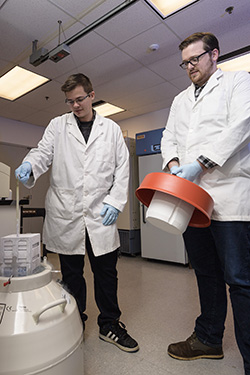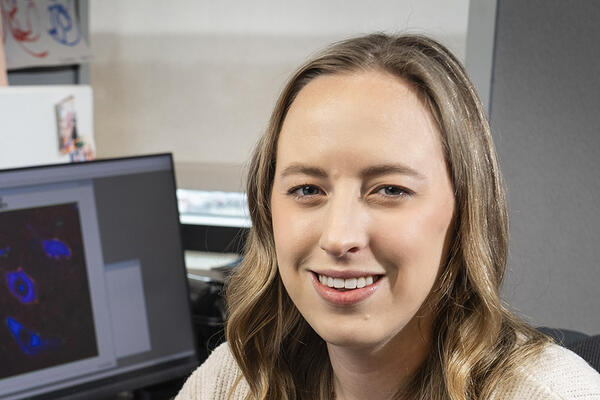On this page:
Why Choose Biomedical Engineering?
Biomedical Engineering (BME) is the application of engineering principles and methods to solve problems in the medical and biological areas. Students in this program work with living systems, apply advanced technology to complex problems in medical care, and observe how their work directly impacts the delivery of human health care. Specialized areas of BME include bioinstrumentation; biomaterials; biomechanics; cellular, tissue, and genetic engineering; clinical engineering; medical imaging; orthopedic engineering; and systems physiology.
Career Prospects
Explore the latest employment and wage data for Biomedical Engineering.
Careers
A master of science degree in biomedical engineering prepares students for employment in many industries including government and medicine. This profession is continually expanding as a result of the immense interest from public, government, scientific, and medical communities to improve quality of life. Employment opportunities include working with artificial organs, electrical muscle stimulators, drug delivery systems, artificial joints, prosthetics, and medical imaging technologies.
Success Stories
Academics and Curriculum

View the Master of Biomedical Engineering program information and degree requirements in the Academic Catalog.
Master of Science in Biomedical Engineering Program Information and Requirements (PDF)
Focus Areas
Biomaterials
For students interested in tissue engineering and nanomedicine for the development of constructs with polymers and stem cells for tissue regeneration (heart, chronic wounds, bone, central nervous system) or nanoparticles for treating several types of cancer and atherosclerosis. Emphasis is placed on the selection of biomaterials and cell types to optimize tissue regeneration, diseased tissue targeting, and treatment.
13 Credit hours required courses – 17 Credit hours elective courses*:
- BME 6421 – Biotransport
- BME 6440 – Biomaterials
- BME 6450 – Tissue Engineering & Regenerative Medicine
- BME 6460 – Nanomedicine Fundamentals
Faculty Advisors:
Orthopedic and medical Devices
For students interested in aspects of medical devices such as the design and manufacturing of orthopedic implants, biomechanics and modeling, or human factors of medical instrumentation and devices. Biomechanics, and biocompatibilities of devices that aim to improve the quality of life of patients with conditions such as trauma, degenerative disease, fractures, and joint arthritis, with the goal to restore functionality and mobility and reduce pain, while considering patient safety and product usability.
17 Credit hours required courses – 13 Credit hours elective courses*:
- BME 6440 – Biomaterials
- BME 6550 – Bioinstrumentation
- BME 6470 – Design of Medical Devices
- BME 7210 – Orthopedic and Prosthetic Engineering
- BME 7220 – Experimental Orthopaedic Engineering
- BME 7371 – Failure of Medical Devices
Faculty Advisors:
A list of electives can be found at: Master of Science in Biomedical Engineering Program Information and Requirements (PDF)
Admission
Entrance Requirements
- GPA of at least 2.7 in undergraduate coursework.
- Prerequisite coursework includes calculus through differential equations, and additional prerequisite coursework may be required for students whose undergraduate degree is not in engineering.
- Three letters of recommendation are optional but not required.
For international students, you must meet these requirements, as well as meet the English proficiency requirements set by international admissions.
How to Apply
Graduate students should apply for admission through Wright State's Graduate School.
